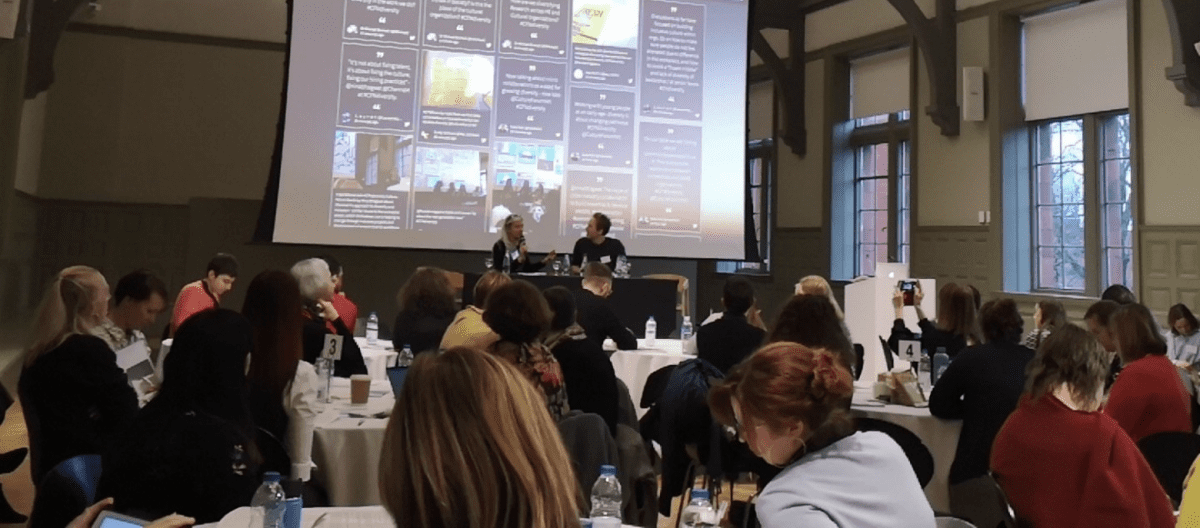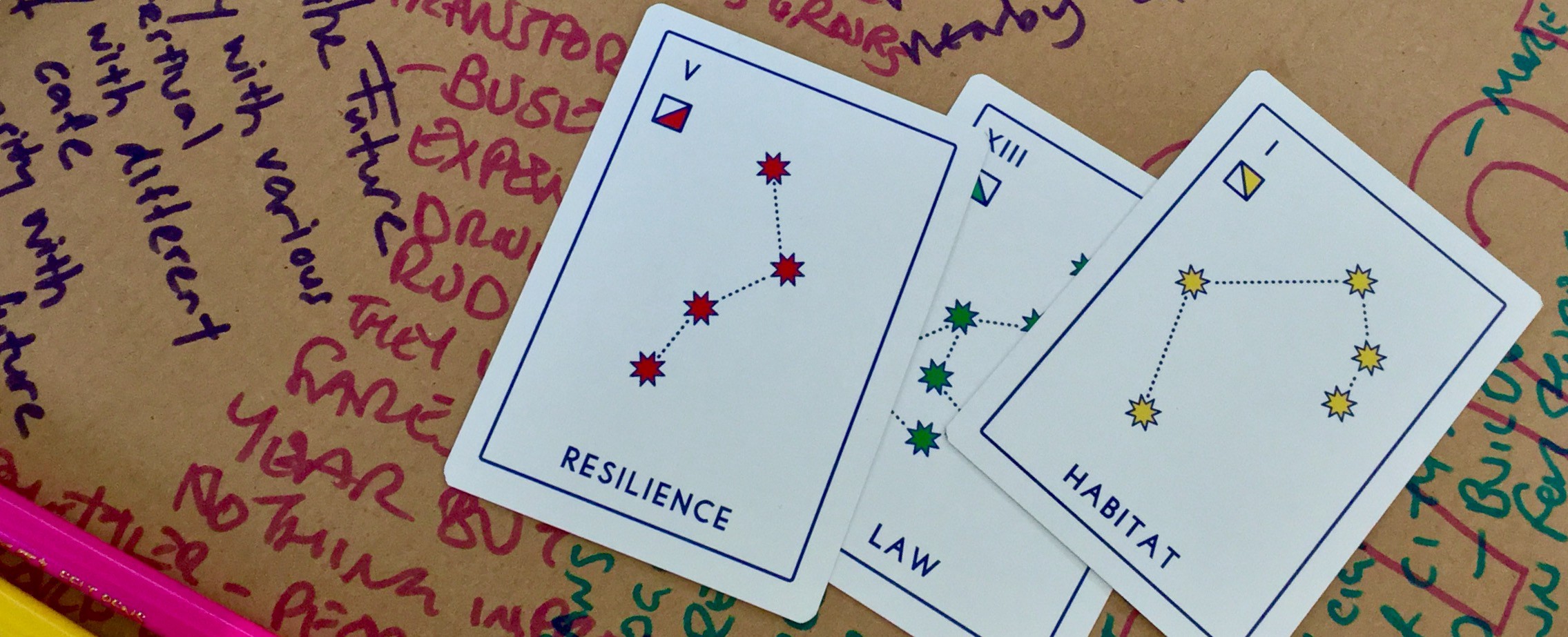Image: Culture Forum North
On Wednesday last week I joined Culture Forum North at the Whitworth Gallery in Manchester for a day of round table discussions and talks on the topic of HE / cultural sector partnership to develop workforce diversity. I wanted to capture some of the discussion points of the day as many of the topics raised are urgent for both the arts and cultural sector and diversity in the workplace more generally. This post is a braindump rather than my commentary, as I wanted to type it out and share before it flies out of my head…
The day kicked off with talks by four people in early career roles working in the cultural sector in the North of England. Katie Jones and Lauren Goldsby, two of the founders of FRESH magazine, talked about their frustration at lack of BAME representation in teaching and working. This became the driver to develop their own award-winning publication FRESH with the aim to share advice to support other students and early career practitioners. They spoke about the importance for young people to see their own identity reflected in the educators and industry professionals that they come into contact with, to know that it is possible and attainable to succeed in the arts and creative careers.
#CFNDiversity kicks off with Katie Jones and Lauren Goldsby from @fressshmagazine – including their new video. pic.twitter.com/0NyRfgaY9H
— Cultural Institute (@UniLeedsCulture) December 5, 2018
Katie also shared her experience of her first employed roles within visual design studios, where she found herself both the only woman and only black person within the small organizations. She described how she began to notice the differences between how her colleagues spoke to her versus other team members – an air of awkwardness around difference, over politeness in fear of doing or saying something wrong – and how she noticed that she began to hesitate and question her own decision making within this unhealthy atmosphere. Katie said that reflecting on this led her to make the decision to work for herself instead of being employed – a decision she is happy with as it has led to opportunities such as FRESH, but this leads to the question: what can we do to make workplaces and the cultural sector inclusive of difference?
Francesca Russo, from Opera North, talked about her experience as someone with an invisible disability entering the cultural sector workforce. She spoke about the importance of having an inclusive workplace culture and to be able to speak openly and frankly to line managers about individual needs. Fran spoke on how layout of space and distance to toilet facilities can make a huge impact on an individual’s wellbeing and ability to work, and how simple agreements between workers and line managers such as having the flexibility to work from home on days when an individual has increased pain or limited mobility can make a big difference. Fran talked about how disability is not a static thing, that no two people are the same and that an individual’s symptoms can fluctuate on a day-to-day basis – “it’s really important that conversations take into account that we all have different experiences and accessibility needs”.
Andy Yates, from Open Eye Gallery, spoke about his experience as someone from a working class background entering the cultural sector. He began his working life working for the public sector and by age 20 was advising benefit claimants on how to apply for crisis loans (a big responsibility for someone so young). Once he had saved up some money he decided to go traveling for a year, and during this time he became interested in Photography – this is how he became interested in the arts and decided to go to university. Andy spoke on how he was the first person in his family to go to university, that studying art was not seen as something that was ‘done’ (as in it wouldn’t lead to a job or wasn’t the sort of thing people do), and now that he had his first job in the cultural sector he now earns less than he did when he was 20 working in the public sector with no degree. So he asked us: “Why should people from lower social/economic backgrounds want to work in the arts?”. This was not to say that people should not want to (Andy also told us about his community outreach work with Open Eye Gallery and his own social engaged practice with joy and enthusiasm so he at least seems happy with where he is right now). Instead the question was a provocation to better understand the social/economic barriers to working in the arts, to be honest about salary and workload, and better define the benefit and value of contributing to the arts.
Talks from these four people about their experiences provided the foundations to discussions throughout the rest of the event. In a room of attendees that were largely white middle aged with ‘director’, ‘head’ or ‘founder’ as job descriptors – these voices were necessary to underpin roundtable conversations with participants who likely did not have direct recent experience of early career roles or may not have the same kind of direct experience of ‘difference’.
“My job is to make myself redundant” Nina Bhagwat, Off Screen Diversity Executive at @Channel4 opens the Culture Forum North symposium @WhitworthArt on diversity in the workforce. #CFNdiversity @ace_national @ace_thenorth @UoMICP @RahmanCllr @ManCityCouncil pic.twitter.com/Oa7PRSEAMK
— magwagdirector (@magwagdirector) December 5, 2018
Nina Bhagwat gave a talk on her work as Channel 4’s Off Screen Diversity Executive and how to build towards sustainable change. Nina wonderfully set the framing of her talk by saying “it’s not about fixing talent, it’s about fixing the culture, fixing our hiring practices”. She went on to set out how to strategize change and move from relying on ‘champions’ and ‘good people’ to making sustainable and meaningful change “with diversity and inclusion as the machine of the organization”.
“In the TV industry, our huge struggle is retention – if you don’t have an inclusive culture, someone with talent can feel othered and leave.”
Nina spoke about the importance of creating an inclusive workplace culture, and to create pathways into early career and onto mid career roles. She spoke about the “frozen middle” and barriers to progressing on from entry positions either due to lack of development opportunities or how some organizations are structured in such a way as to have no/few roles between entry positions and senior management positions. To address this Nina called for us to think flexibly and to build pathways that work for our individual organizations and workforce. Nina gave the example of supporting two-way secondment opportunities for staff to develop their experience within another organization so both organizations can benefit from a workforce with broader/deeper experience. She also gave the example of reverse mentoring, where senior managers are mentored by employees to build empathy and understanding of difference.
#CFNdiversity Nina Bhagwat talks us through 4 stages towards ‘D&I nirvana’
“stage one and stage two relies on ‘champions’ when it should be in the machine of the organisation’ which stage do you think your organisation is at? pic.twitter.com/Cr04TEcUwL— CultureForumNorth (@CultureForumNrt) December 5, 2018
Nina also framed her talk around moving beyond a moral case for a diverse and inclusive workforce to a business case. She emphasized that broadly people understand the moral case but argued that if we are to shift from reliance on individuals towards strategic change we need to build the business case – this business case will then make organizations responsible and accountable and drive sustainable change. Nina set out three points to make strategic change:
- Inclusivity (culture, hiring, build understanding at senior levels, inclusive talent programmes)
- Accountability (agenda, objectives for senior/mid level, cycle of evaluation/review/adjustment)
- Better Data (transparency, intelligent interpretation, define priority strands)
#CFNDiversity data is first step for setting priorities. Look at how other sectors to see what they are doing to make themselves transparent & accountable (banks, NHS). Intersectionality, representative groups & reverse mentoring key to inclusive culture – @ninabhagwat pic.twitter.com/R0CxRKZVZO
— Dr Abi Gilmore (@Abi_Gilmore) December 5, 2018
Kate Pahl gave a talk on her community-engaged research practice which focused on community collaboration and knowledge creation. She spoke about how to recognize the investment made by communities to research projects through paying for their time and designing research projects with co-curating and collaboration at the centre of design. She also spoke about the importance that knowledge production takes place within the communities and their sense of place, for practical reasons such as cost for individuals to travel to a university campus, to ideas of how knowledge is situated and how place shapes knowledge.
Questions for you, us. #CFNDiversity pic.twitter.com/Zpz65XCJKG
— V K McCorkell (@VickiMcCorkell) December 5, 2018
For me this talk was great to set out how and why research about communities needs to shift from seeing communities as subjects to co-producers. However, important points were raised during roundtable discussions that the formal research outputs of this kind of collaborative knowledge production will continue to only recognize the researchers and not the community members as the authors of the knowledge produced. Kate showed a slide with an image of a book cover that formed the research output of one of the projects – this included the work and contributions of community members who co-produced the knowledge that was formed through the project but the book only listed the HE researchers as the authors. The table discussion continued to highlight how (if ever) representation of communities could be addressed in regards to ownership and academic authorship. On reflection, this talk focused on the co-creation of knowledge but not the (co-)ownership of knowledge – and it left me wondering what the benefits to both researcher and community are in this kind of scenario? The researchers are the instigators and decide when and where knowledge is to be created, and the quality of their research output increases through co-production, and this builds the body of work in their name. But what are the benefits to the community beyond being better represented in someone else’s book? The benefits to the researcher don’t directly translate to the community, and I can’t help but feel they are still ultimately the subjects and are without the same agency and ownership as the researchers.
Other points that came up through roundtable discussions:
- Lack of state education funding and lack of arts representation in national curriculum is hugely concerning (the word ‘crisis’ was used repeatedly), and what can we do jointly or individually to address this?
- A number of people commented that they only had opportunity to enter the arts through free university fees and that younger generations in their family are unlikely to enter HE or the arts.
- How to recruit those without university degrees or how to provide alternative art schools.
- How the arts sector defines and understands research is different to the academic definition of research.
- In small organizations, providing mentoring to support early career employees to apply for roles in other organizations with developed responsibilities is an important and impactful contribution to the development of a diverse and inclusive workforce.
- In small organizations, one individual is a huge percentage of that team’s workforce. There are big risks and potential costs associated with hiring new people with additional needs. There needs to be honest discussion about this and strategies/support shared regarding this.
- Could we ensure that workers in the arts and cultural sector are paid more by hiring less people on higher wages, or does this only limit the number of people who get the opportunity to work?
- We should just ‘do it’ rather than waiting for increased funding or policy change. If we want change we should work with what we have to make change happen in whatever way we can.
Big thanks to Culture Forum North, Opera North for organising and the Whitworth for hosting!




